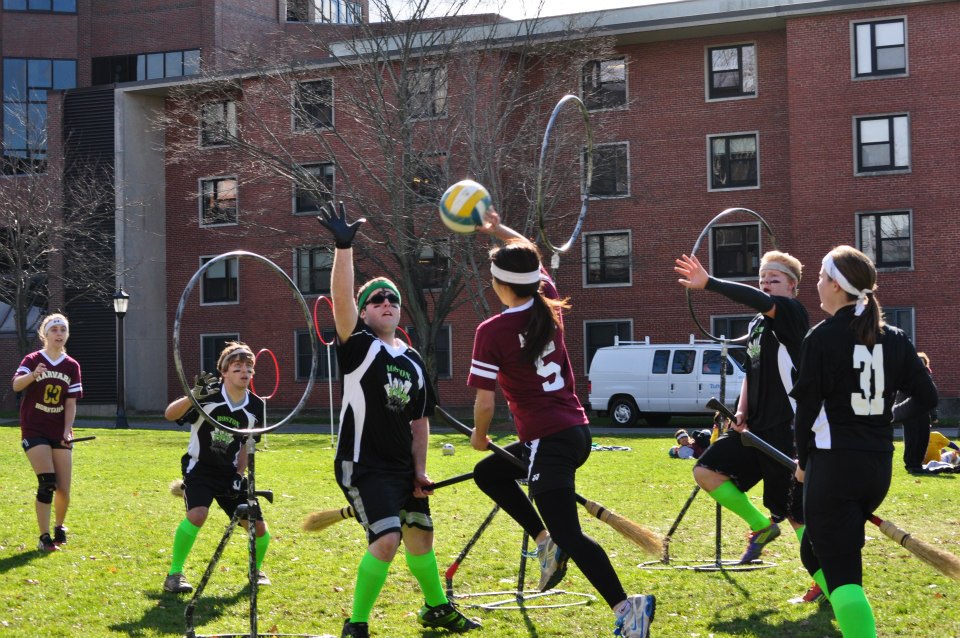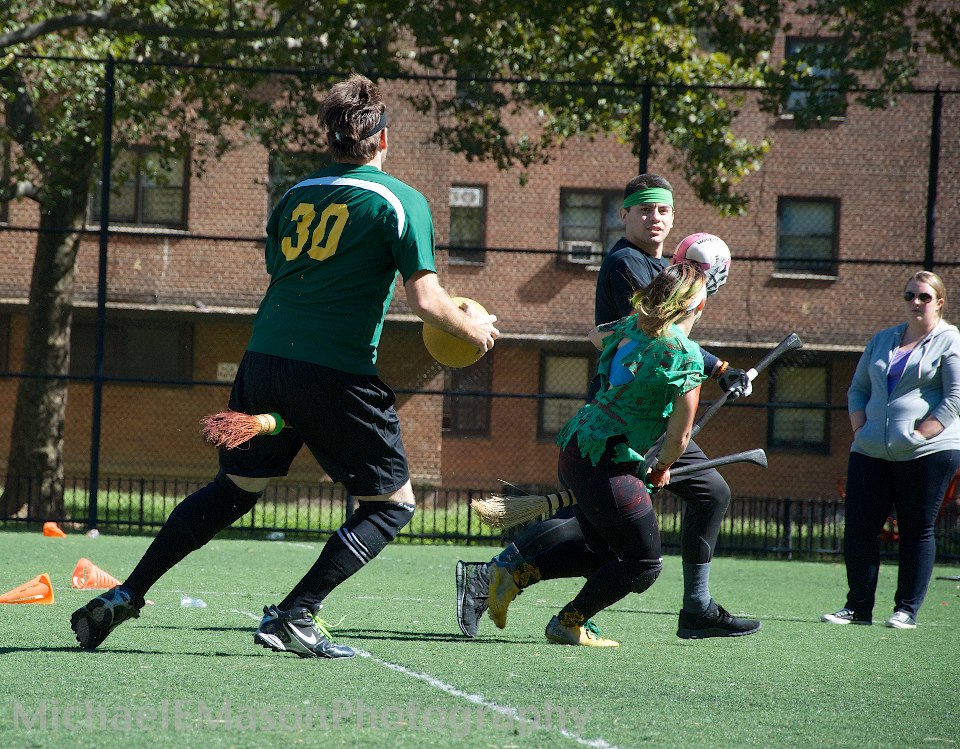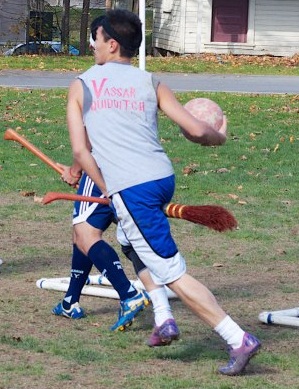- Rule, Britannia, no more?
- Unpopular Opinions: US Quadball Cup 2023
- Proven Contenders: University of Virginia
- Proven Contenders: Rutgers University
- Proven Contenders: University of Michigan
- Proven Contenders: Creighton University
- Different Perspectives: A Look Inside USA Ultimate
- Antwerp QC, Much of Belgian Core, Leaves Competitive Quidditch
Northeast Regional Preview
- Updated: November 15, 2012


Harvard is expected to lock up a World Cup bid this weekend, but the newly-formed Boston Riot sit very much on the bubble after a strong weekend in the Massachusetts Quidditch Conference. Credit: Emily Oliver
The Northeast Regional Championship begins first thing tomorrow morning in lovely Newport, R.I. With 11 spots to World Cup VI to be given out, the most of any region, there is a lot for the Northeast to be proud of.
But there is also plenty left for the region to prove, with other regions like the Southwest and West getting stronger every day. Everyone knows the Middlebury name, but questions have once again abounded after an early season loss to Canada’s Finest. The Boston teams have worldwide recognition, but have developed a bad habit of coming up short on the international stage, while the Long Island teams remain unknown factors with plenty of hype surrounding them
So which teams will rise to the challenge on the region’s biggest stage, and can the Northeast deliver the quality of play necessary to erase the stigma that surrounds it? The Eighth Man dives into the 24-team field to find out.
The Favorites
No. 12 Boston University – There’s a lot to be said about this team, but not enough time or space to do so. We’ll keep it short: you don’t want to play this team. They bring it hard every time they go out on the pitch, and it’s the reason why they’ve been a powerhouse for so long.
They’re tough defensively – where they are anchored by Brandon Stack – and offensively – where they love to score in transition, and have a ton of depth at all positions. They have one of the best seekers in the country, John Blacker, and, even though they lost Kedzie Teller this year, captains Joe Barkus and Max Havlin are just as capable chasers. Havlin can be especially dangerous, adept at running the break and always finding the right pass.
Boston University is about as complete and well-organized of a team as you will find in quidditch today, and have every reason to feel confident entering the weekend.
No. 12 Emerson College – Emerson is one of the most storied programs in the Northeast, with a history dating all the way back to World Cup II. They are also one of the most successful teams, with wins in the Champions Series and Massachusetts Quidditch Conference Championship in May and Season Opening Tournament in October.
With a massive pool of players and the backing of the majority of their school, Emerson can consistently put together a top-tier lineup. With physical keepers David Fox and Victor Viega backing a chasing line that is equal parts quick and smart, there aren’t many weaknesses. Besides a pair of hiccups against Tufts, both of which were snitch grabs when Emerson had a lead, the squad has had a flawless season, even winning convincingly against Boston University. Don’t expect them to slow down in Rhode Island.
No. 23 Hofstra University – Hofstra may have gotten a lot of its work so far this season in the Mid-Atlantic, but it proved itself despite that. At the Brotherly Love Cup, Hofstra had the toughest pool, and tore it apart. They crushed lesser teams, and disposed of big name teams like the University of Rochester (130*-10) and Vassar College (130-40*) without a second thought. They were also just 40 points behind Mid-Atlantic Champions No. 2 Villanova University when they snitch was caught, a closer game than anyone but No. 3 University of Maryland and No. 15 Penn State University gave them at regionals.
Hofstra’s success begins with captain and chaser Jayke Archibald, a tall, lanky player who throws his body around with the best of them. He leads a physical chasing defense that can force your beaters far upfield, leaving you open for a fast break. Hofstra can score early and often, and will be expected to do so this weekend.
No. 22 Middlebury College – Well, here we are. What is there to say that hasn’t been said a million times? We’ve all heard their time is up, that this is the year they’ll lose. But again and again, the little college that could finds a way.
Middlebury lost their first tournament ever when the skeleton team they brought to Champions Series underwhelmed and finished poorly, and picked up another official loss this season to McGill University’s second team. But the fact remains that they are still the undisputed Champions of Quidditch. While they will be weaker, they will always have a legitimate shot of winning any tournament they enter as long as the mystique remains.
The Contenders
No. 24 Tufts University – Tufts has become one of the more confusing teams in the IQA. Seemingly overnight, they stormed to the top of the quidditch world, making the finals of World Cup IV. Then, last year, with expectations incredibly high, they laid an egg, failing to get out of their fairly loaded World Cup V group.
This year, their season got off to a hot start when they pulled the snitch in overtime against Emerson, and followed it up three weeks later with a second win over the regional power, and it may have been exactly what the squad needed to jumpstart their season. Tufts is far deeper than last year’s team, and if they have veteran chaser Raj Reid, captain and chaser Howie Levine and keeper Jared Nash at full strength, these guys should be booking a trip to Florida with ease.
Harvard University – Similarly to Tufts, Harvard has recently gone under the knife – already with two games each against Emerson and Boston University – and came out better for it. They’re bigger, faster, better and hit harder than they ever had before. They earned second place at the first MCQ Tournament this fall, and if they can deal with their ever-present lack of depth, they will continue to build on those successes moving forward.
For a long time, it was always considered a three team race in Boston—Emerson, BU and Tufts—but we may have a fourth team, led by rugby-style chaser Andrew Murray and talented seeker Hank Smith, joining the fray. If they play with the strategy and intelligence they’ve displayed in the MQC, they can surely start dreaming of Orlando.
University of Rochester – You don’t need to know much about Rochester to know they’ll be competitive. In a quickly shifting quidditch world full of teams moving up from Div. II or fresh faces, Rochester is an experienced and talented team. They have learned a lot from crashing out of a weak pool at World Cup V, and will not overlook what is likely the easiest pool at the regionals.
While their results have sometimes been a mixed bag, their talent isn’t. Devin Sandon is one of the quickest chasers in the region, and is almost impossible to get a hand on, while Harry Clarke, who moved to beater after World Cup V, combines a strong understanding of the game with a cannon for an arm. Many teams attending Northeast Regionals lack even one player with that level of talent, but Rochester has multiple, which should be more than enough to push them through.
Vassar College – Just like Rochester, these guys are the epitome of experience. Vassar was one of the first Quidditch teams ever created, and will competing with some of the other founding fathers in a challenging Pool A that includes Emerson and Middlebury.
That pool will likely be the only thing threatening their chances of a World Cup bid, because, although Vassar is more well known for their refusal to lose the capes and their determination to make games as fun as possible, they still made the semifinals of World Cup IV and followed it up with an elimination round appearance in World Cup V. Vassar makes up for a less physical style with precision passing and top-of-the-line beating, and many teams will struggle to contend with their experience.
The Underdogs
Macaulay Honors College – You can say we’re all on the bandwagon as well. Along with one of the nation’s best pre-game chants, solid depth at every position makes it very likely that they will be capable of surviving a two-day tournament. Nearly everybody on this team is capable of logging some serious minutes, and when teams are most likely going to have to endure four or five games before even reaching the elimination bracket, that will be key. Besides, how can you pick against America’s darlings?

The New York Badassilisks have proven they can contend with top college sides, and should be in the running this weekend. Credit: Michael E. Mason
New York Badassilisks – Ah, our token Community team. For a long time, Community teams were a bit of a punchline, never ready taken seriously. But with the addition of teams like the Silicon Valley Skrewts, the Lost Boys in Los Angeles, and the soon-to-be Boston Massacre, they’ve demanded more attention.
At the forefront of the movement are the Badassilisks. They’re bigger than ever and know how to play to their strengths, even managing to score a tournament win and a victory over Hofstra at the Zombie Tournament earlier this fall. They have one of the great minds in the game in coach Clay Dockery, and are more than capable of executing a gameplan. It remains to be seen how they’ll stack up against the best of Massachusetts – they are in a pool with both Boston University and Boston Riot – but there is no reason to believe they don’t have what it takes.
Boston Riot – Finally, we come to our dark house squad: the Boston Riot. For those who don’t know, the Riot are Emerson’s B-team. After playing one of the toughest schedules in the region so far this year, they could definitely pull together what has been one crazy learning experience and turn it into a World Cup spot-worthy performance.
As a team that’s barely a month old, they have tons to work on, make no mistake. Lead by former veterans of Emerson, Liz Fisher and Todd Mitchell, the team has tons of experience to grow on. Their male beaters are incredibly strong, their male keepers – Ben Wessels and Jagger Kugler – are defensive stalwarts, and they’ve proven they can hang with anyone, losing 60*-40 to Tufts just two weeks ago. Their snitch game may hamper their performance, but if they can figure it out, expect big things from the Riot.
Players to Watch
Tom Skudlarek – Chaser – Rochester Institute of Technology
Skudlarek has everything you want from a chaser physically: speed, power, a precise pass and a solid tackle. But what separates him from the pack is his positioning. Tom plays smart, moves to space, is aware of beaters and always knows where his passing options are. He may be a rookie, but he should not be underestimated on either side of the ball.
Aaron Wohl – Beater – Emerson College
Wohl is one of the smartest beaters out there, but his tenacity and aggressiveness are just as exciting to watch. While most beaters excel in either intelligence or athleticism, Wohl pairs them together magnificently. The combination creates a tough wall of defense for an Emerson team that already had plenty of depth in its beater lines.
Tim Keaney – Chaser – Hofstra University
One of the more underrated and little-known players in the Northeast, Keaney is the creator of most of Hofstra’s offense. Shifty, nimble and quick, he almost never gets tackled, and can dodge a bludger with the best around. He is a deadly scorer, but is far and away the best passer on the team. His field vision is immaculate, and he provides his teammates with easy goals from his deadly, defense-slicing passes.

Peter Lee has become an essential part of Vassar’s offense and defense. Credit: Michael E. Mason
Peter Lee – Beater – Vassar College
Lee can at times be a dominating force on the pitch. His extremely aggressive style on both offense and defense can create major issues for even well-oiled teams. On offense, he will lead the charge, creating space and opportunities to score both with actual beats and the threat of beats. On defense, he uses his skills at deflecting and catching opposing bludgers to effectively nullify attempts to contain him, and, when free, is quickly in the face of opposing chasers, creating bad passes and shots.
Andrew Murray – Chaser – Harvard University
Few players are more vital to a team’s success than Murray is to Harvard’s. Undersized, he finds ways to use that quality to his advantage, slipping out of tackles or using the quaffle to block off any throwing angles for beaters. He also can hit with the force of a football linebacker, and will rarely have a tackle broken. Harvard lacks depth, and Murray plays nearly every minute without complaint. He is the team’s main scoring outlet and defensive linchpin, and whether or not the squad qualifies this weekend will lie largely on his shoulders.
| Writer | Pool 1 | Pool 2 | Pool 3 | Pool 4 | Pool 5 |
|---|---|---|---|---|---|
| Alan Black | Emerson | Rochester | Hofstra | Tufts | Boston University |
| Curtis Taylor | Emerson | Rochester | Hofstra | Harvard | Boston University |
| Devin Sandon | Emerson | Rochester | Hofstra | Tufts | Boston University |
| Kevin Oelze | Emerson | Rochester | Macaulay | Tufts | Boston University |
| Luke Changet | Emerson | Rochester | Hofstra | Harvard | Boston University |
| Steve DiCarlo | Emerson | Rochester | Hofstra | Tufts | Boston University |
| Zach D'Amico | Emerson | Rochester | Hofstra | Tufts | Boston University |
| Writer | Winner | Runner-Up |
|---|---|---|
| Alan Black | Boston University | Emerson |
| Curtis Taylor | Emerson | Boston University |
| Devin Sandon | Boston University | Hofstra |
| Kevin Oelze | Emerson | Boston University |
| Luke Changet | Boston University | Hofstra |
| Steve DiCarlo | Boston University | Hostra |
| Zach D'Amico | Emerson | Hofstra |
(Ethan Sturm, Clay Dockery and Devin Sandon contributed reporting to this article.)

10 Comments